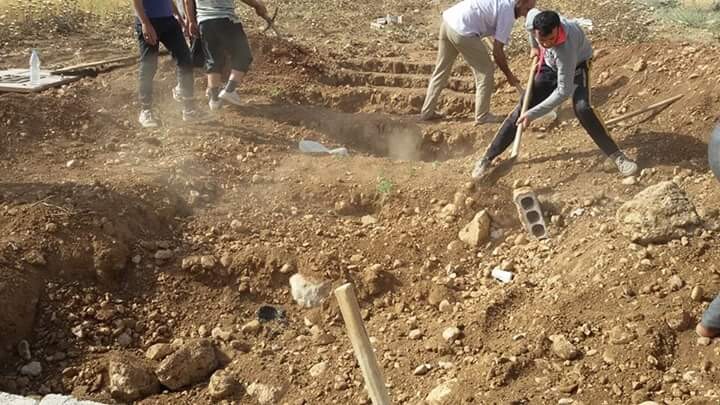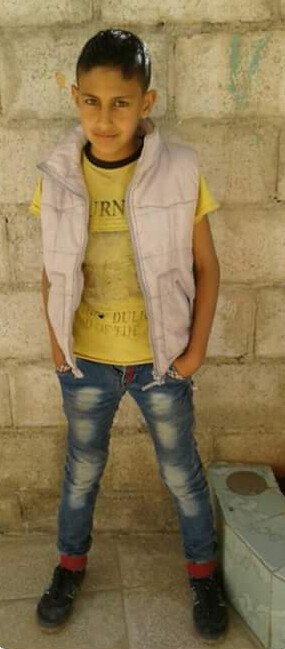Rights and Accountability 17 May 2016
Nearly a dozen people have been killed in Khan Eshieh refugee camp on the outskirts of Damascus since late Monday as fighting between armed rebels and Syrian government forces has engulfed the surrounding area, according to a Palestinian education and relief group.
The Jafra Foundation stated on Tuesday that three internally displaced persons were killed during heavy shelling that began one day prior, “with continued artillery fire targeting civilian sites in the Khan Eshieh area.”
The group added that Russian planes fired on the camp and its surroundings.
A video uploaded to YouTube is said show a Russian airstrike on the camp on Tuesday:
Another video is said to show a helicopter dropping four bombs on Khan Eshieh: The Action Group for Palestinians of Syria reported that government forces bombed the main street in the camp.On Tuesday, “a civilian car was hit by shelling, killing six persons, including one small child and his mother,” according to Jafra.
Video shows the vehicle in which the civilians were killed:
Another video uploaded on Tuesday is said to show the only hospital in the Khan Eshieh area after it was bombed: One of those killed on Tuesday was identified as Ahmad Hasan Awad: Also slain was Hamza Muhammad al-Dali: Jafra reported that an 8-year-old girl who was severely injured by shelling had one of her hands amputated due to the lack of medical supplies in the camp.The Action Group reported that both armed opposition and government forces were preparing for a government assault on the camp.
“Today, Syrian government patrols began to advance on the Khan Eshieh area, and some Syrian government soldiers were said to have been captured during this advance,” Jafra stated on Tuesday.
Jafra volunteers in the camp, while advised by the group to stay at home, have been helping to bury victims and evacuating injured persons.

Camp youths dug graves this morning and came under shelling while doing so, according to Jafra.
“Jafra volunteers have taken responsibility for warning all civilians, over mosque loudspeakers, to stay inside their homes, to not crowd together in public, and to not crowd in spaces where shelling has hit and injured persons,” the group adds.
“All roads into and out of the camp and [the surrounding] area have been closed, as they have been targeted by heavy shelling and artillery sniping,” according to Jafra. “Last week three young persons were killed traveling on Zakia Road, dubbed by residents as ‘Death Road.’”
The main roads between the camp and Damascus have been closed since 2013, according to the group. The Zakia Road is the only route used by civilians since that time.
“This road has grown increasingly dangerous to travel, but due to the lack of supplies inside the camp, residents were forced to use the road to retrieve supplies from neighboring Zakia town,” Jafra stated. “This has resulted in the death of many civilians.”
Civilians in the camp were placed at greater risk of direct targeting after Syrian government forces advanced 800 meters closer to the route used by Khan Eshieh residents, Jafra stated.

Muhammad Majid Sanad was killed along with his mother, Rawda Jabir, when the car in which they were traveling was hit. (Photo courtesy of Jafra Foundation)
“Heavy shelling, barrels and cluster munitions have struck the areas around the camp,” Jafra reported on 9 May. “At least 20 barrel bombs have fallen daily in the surrounding areas for the last two weeks.”
According to the Action Group, more than 150 residents of Khan Eshieh camp have been killed since popular protests that began in March 2011 were met with lethal force and were followed by a bloody civil war that has claimed hundreds of thousands of lives and displaced millions.
Before the war, the camp was home to more than 20,000 refugees registered with UNRWA, the United Nations agency for Palestine refugees.
The Jafra foundation estimates that 12,000 civilians, including 3,000 children and 1,000 elderly persons, remain inside the camp and lack access to essential supplies.
Last month, Palestinians in Yarmouk refugee camp near Damascus came under fire once more as fierce fighting between rival armed groups broke out in the camp, preventing the thousands of civilians who remain there from accessing food and water.
More than 100,000 of the 560,000 Palestinian refugees previously living in Syria have since fled and half of the 450,000 estimated to remain have been displaced at least once inside the country.
Most Palestinian refugees in Syria were forced from their homes during the ethnic cleansing of Palestine around the time of the declaration of the State of Israel in May 1948, or are the descendents of those who were displaced.
For decades Israel has denied them and millions of other Palestinian refugees their right to return to their homeland.
World powers convened in Vienna on Tuesday in an attempt to stop an 11-week partial truce in Syria from collapsing and to transform it into a more robust ceasefire.
The 21 countries and organizations comprising the International Syria Support Group have set a deadline of 1 August for the formation of a transitional government, to be followed by elections.





